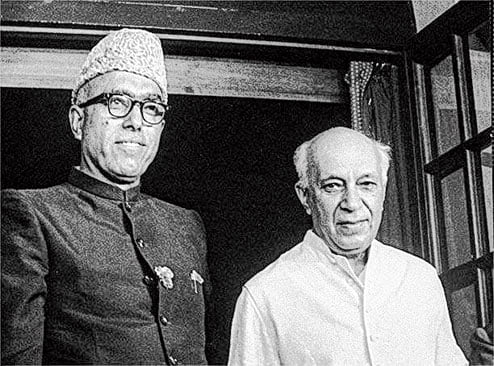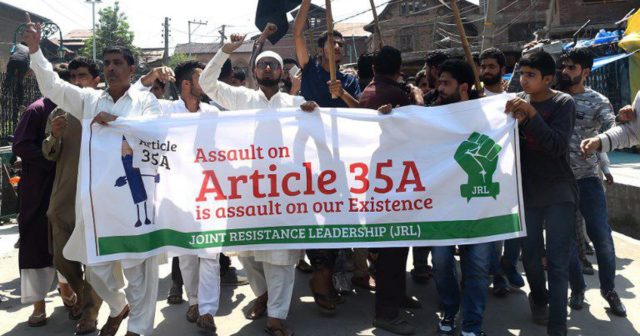Demystifier: An ED Original where we take a complex topic but the content is written in such a way that it is knowledgeable and easy to comprehend at the same time.
The Supreme Court of India will hear the challengers of Article 35A of the Constitution.
It seems to be boring at first, but consider the backdrop –
- General elections are 2 months away and one of BJP’s all time favourite election manifesto is scrapping Article 370 and 35A.
- Kashmir is at center-stage post Pulwama attack and the people feel vulnerable.
- Rise of Anti-Kashmiri sentiment has hiked the feeling of Kashmiri isolation from the rest of India and vice versa and has increased their trust deficit.
- Consider the history as well.
A very, very brief history

The princely state of Jammu & Kashmir was ruled by Dogra Rulers. Around 1930s, Maharaja Hari Singh issued a notification which defined the state and its subjects. It was done to contain foreign (non-J&K) influence.
During partition, the Maharaja wanted it to become an independent state. When Pakistan tried to acquire it by military action, India helped the princely state and J&K became a part of India when the Maharaja signed the Instrument of Accession on 26 October, 1947.
Later negotiations were made between the then PM of Jammu and Kashmir, Sheikh Abdullah and PM of India, Jawaharlal Nehru. But J&K said the provisions of the Indian Constitution should not be applied to it like it does to the other states.
Conditions of autonomy were accepted keeping in mind the terms of accession and the international pressure because the issue of Kashmir was taken to the United Nations.
Now, some key points to keep in mind regarding the situation with Kashmir:
- The controversial Article 270 was a temporary provision to provide autonomy to J&K.
- Article 35A was added to acknowledge the permanent residents of J&K.
- They aimed to protect the culture and economic prospects of the natives along with integrating the people with the rest of India.

Also Read: Kashmir Plebiscite vs. Referendum : Do You Know The History Of It?
Article 35A
Article 35A empowers the Legislature of Jammu and Kashmir to decide who is a permanent resident of J&K.
It states that only these permanent residents can have the right to public employment, acquire property, vote and have other government facilities.
Who is a permanent citizen?
1. Anyone born or settled in J&K before May 14, 1954.
2. Anyone who acquired immovable property, lawfully.
What is wrong with it?
The Article is at crossroads with the Indian constitution.

- Violates fundamental rights
If a woman marries a non-state subject (i.e. not of J&K), her children and her husband would not be recognized as permanent residents. This is not applicable if a man does the same.
Indian citizens have the right to vote, contest elections, buy property, avail government jobs and services, etc anywhere in India – except for Jammu and Kashmir. Only the permanent residents of J&K can do so.
Therefore, Article 35A violates the Basic Structure of the Indian constitution and several fundamental rights such as right to equality, liberty, non- discrimination and what not.
- Hampers Fraternity, Integrity
The Article is against the spirit of ‘oneness of India’ as it gives the permanent residents a separate identity, of belongingness to J&K only and not to India (Jammu and Kashmir even has its own flag, constitution and citizenship).
It gives non-permanent members a sense of exclusion within the state.
It is evident that the article did not fulfill its motive of integration; instead, they created a sense of exclusion. They should therefore be scrapped.
But scrapping such privileges all of a sudden will create instability in the region and insecurity amongst the people of J&K. Doing it in a phased manner might work.
Anyway, now might not be the right time for amendments considering the volatile situation.
Image Credits: Google Images
Source: Knapilly, Indian Express, The Times of India
Find the blogger @parihar_tweets
You’d also like to read:
































